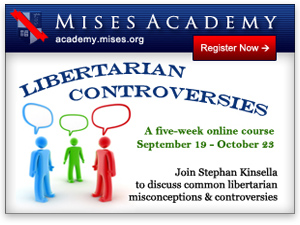Kinsella’s “Libertarian Controversies” Course: Audio and Slides
Anti-Statism, Education, Libertarian Theory, Statism At the 2011 Annual Meeting of the Property and Freedom Society (May 27-29, 2011), I delivered a speech entitled “Correcting some Common Libertarian Misconceptions.” The video is here, and streamed below. It engendered a good deal of discussion and interest, and I could only touch on a small number of the topics I had assembled over the years, so later in the year, I conducted a 6 week Mises Academy course, “Libertarian Controversies” (Mondays, Sept. 19-Oct. 23, 2011), to cover these and related topics in greater depth. The course was planned for 5 weeks initially, but I added a sixth “bonus” lecture at student request. The course is discussed in my Mises Daily article “Libertarian Controversies.”) The audio and slides for the 6 lectures of the course are provided below, following the PFS lecture, below. The “suggested readings” for each lecture are appended to the end of this post.
At the 2011 Annual Meeting of the Property and Freedom Society (May 27-29, 2011), I delivered a speech entitled “Correcting some Common Libertarian Misconceptions.” The video is here, and streamed below. It engendered a good deal of discussion and interest, and I could only touch on a small number of the topics I had assembled over the years, so later in the year, I conducted a 6 week Mises Academy course, “Libertarian Controversies” (Mondays, Sept. 19-Oct. 23, 2011), to cover these and related topics in greater depth. The course was planned for 5 weeks initially, but I added a sixth “bonus” lecture at student request. The course is discussed in my Mises Daily article “Libertarian Controversies.”) The audio and slides for the 6 lectures of the course are provided below, following the PFS lecture, below. The “suggested readings” for each lecture are appended to the end of this post.
Earlier courses included “Rethinking Intellectual Property: History, Theory, and Economics” (discussed on the Mises Blog in Study with Kinsella Online; Lecture 1), in late 2010, which I reprised in Spring 2011: “Rethinking Intellectual Property: History, Theory, and Economics” (discussed in Rethinking IP; and on the Mises Blog in Study with Kinsella Online and in Rethinking Intellectual Property: Kinsella’s Mises Academy Online Course); “Libertarian Legal Theory“; and “The Social Theory of Hoppe.” The audio and slides for the Rethinking IP course are available here, and here for Libertarian Legal Theory (Hoppe course material coming soon).
In Teaching an Online Mises Academy Course, I offer my reflections on teaching the Rethinking IP class the first time. Here is some feedback provided by past students of the Rethinking IP course:
“The class (everything) was perfect. Content wasn’t too deep (nor too shallow) – the reviewed material was just brilliant and the “tuning” was great for someone like myself (engineering background – no profound legal/lawyer experience). It provided all the material to really “understand” (instead of “just knowing”) all that was covered which I find always very important in a class.”
“Instruction was very comprehensive and thought provoking. The instructor was fantastic and very knowledgeable and answered every question asked.”
“Learned more then i expected, the professor seemed to really enjoy teaching the class, and the readings provided were excellent. Overall for the cost I was extremely satisfied.”
“Very interesting ideas I was not exposed to. Inexpensive, convenient, good quality.”
“It is a very fascinating topic and I was quite eager to learn about what I.P. is all about. I thought that Professor Kinsella was able to convey complicated issues to us clearly.”
“Professor Kinsella’s enthusiasm and extra links posted showed his true knowledge and interest in the subject. Great to see.”
And:
Thank you so very much for all the excellent work — very few classes have really changed my life dramatically, actually only 3 have, and all 3 were classes I took at the Mises Academy, starting with Rethinking Intellectual Property (PP350) (the other two were EH476 (Bubbles), and PP900 (Private Defense)). …
My purposes for taking the classes are: 1. just for the fun of it, 2. learning & self-education, and 3. to understand what is happening with some degree of clarity so I can eventually start being part of the solution where I live — or at least stop being part of the problem.
The IP class was a total blast — finally (finally) sound reasoning. All the (three) classes I took dramatically changed the way I see the world. I’m still digesting it all, to tell the truth. Very few events in my life have managed to make me feel like I wished I was 15 all over again. Thank you. …
[M]uch respect and admiration for all the great work done by all the members of the whole team.
Students would often give real-time feedback, in comments such as the following at the end of the lectures (these are from the actual IP-lecture chat transcripts):
- “Thank you, great lecture!”
- “Thanks, excellent lecture.”
- “Great job.”
- “Great lecture!”
- “Thank you, Sir. Great lecture!”
- “Thanks for an excellent talk.”
Student reaction to the first lecture of my Libertarian Legal Theory course can be found in Student Comments for First Lecture of Libertarian Legal Theory Course: Not Too Late to Sign Up!
“The class (everything) was perfect. Content wasn’t too deep (nor too shallow) – the reviewed material was just brilliant and the “tuning” was great for someone like myself (engineering background – no profound legal/lawyer experience). It provided all the material to really “understand” (instead of “just knowing”) all that was covered which I find always very important in a class.”
“Instruction was very comprehensive and thought provoking. The instructor was fantastic and very knowledgeable and answered every question asked.”
“Learned more then i expected, the professor seemed to really enjoy teaching the class, and the readings provided were excellent. Overall for the cost I was extremely satisfied.”
“Very interesting ideas I was not exposed to. Inexpensive, convenient, good quality.”
“It is a very fascinating topic and I was quite eager to learn about what I.P. is all about. I thought that Professor Kinsella was able to convey complicated issues to us clearly.”
“Professor Kinsella’s enthusiasm and extra links posted showed his true knowledge and interest in the subject. Great to see.”
***
Update: the audio files may also be subscribed to in this podcast feed. (In iTunes (for Windows) you can subscribe to podcast by copying the feed address to iTunes>Advanced>Subscribe to podcast; on Macs, you can click on the link to have iTunes add it to podcasts.)
“Correcting some Common Libertarian Misconceptions,” 2011 Annual Meeting of the Property and Freedom Society (May 27-29, 2011) (video)
pfs-2011 Stephan Kinsella, Correcting Some Common Libertarian Misconceptions from Sean Gabb on Vimeo.
“Libertarian Controversies”: Mises Academy (Mondays, Sept. 19-Oct. 23, 2011)
LECTURE 1:
LECTURE 2: …
Kinsella’s “Libertarian Controversies” Course: Audio and SlidesRead More »
Kinsella’s “Libertarian Controversies” Course: Audio and Slides Read Post »


 I’m really happy with this way
I’m really happy with this way  In the days following the gift-giving holidays, many millions of people stand in judgement over the quality of the gifts they gave and the gifts they receive. Did they arrive on time? Did the quality hold up? Did the reality match the advertising hype? The Internet ads an extra wrinkle. Anyone dissatisfied can post blistering attacks on any merchant and the product in questions. Anyone can vote up or vote down.
In the days following the gift-giving holidays, many millions of people stand in judgement over the quality of the gifts they gave and the gifts they receive. Did they arrive on time? Did the quality hold up? Did the reality match the advertising hype? The Internet ads an extra wrinkle. Anyone dissatisfied can post blistering attacks on any merchant and the product in questions. Anyone can vote up or vote down.